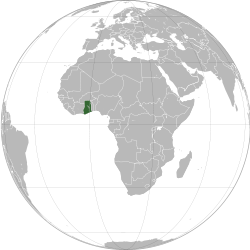
Back Гана Abkhazian Ghana ACE Ганэ ADY Ghana Afrikaans Ghana ALS ጋና Amharic Ghana AMI Ghana AN Ghana ANG Ganà ANN
Republic of Ghana | |
|---|---|
| Motto: "Freedom and Justice" | |
| Anthem: "God Bless Our Homeland Ghana"[1] | |
 | |
| Capital and largest city | Accra 5°33′N 0°12′W / 5.550°N 0.200°W |
| Official languages | English |
| Government-sponsored languages | Akan, Ewe, Dagomba (Dagbani), Dangme, Dagaare, Ga, Nzema, Gonja, Kasem[2] |
| Demonym(s) | Ghanaian |
| Government | Unitary presidential constitutional republic |
| John Mahama | |
| Jane Naana Opoku-Agyemang | |
| Legislature | Parliament |
| Independence from the United Kingdom | |
• Declared | 6 March 1957 |
• Republic | 1 July 1960 |
• Current Constitution | 28 April 1992 |
| Area | |
• Total | 239,567 km2 (92,497 sq mi) (80th) |
• Water (%) | 4.61 |
| Population | |
• 2020 estimate | 31,072,940[3] (47th) |
• 2010 census | 24,200,000[4] |
• Density | 101.5/km2 (262.9/sq mi) (103rd) |
| GDP (PPP) | 2020 estimate |
• Total | $226 billion[5] |
• Per capita | $7,343[5] |
| GDP (nominal) | 2020 estimate |
• Total | $69.757 billion[5] |
• Per capita | $2,266[5] |
| Gini (2012) | 42.4[6] medium |
| HDI (2018) | medium · 142nd |
| Currency | Ghana cedi (GH₵) (GHS) |
| Time zone | UTC0 (GMT) |
| Driving side | right |
| Calling code | +233 |
| ISO 3166 code | GH |
| Internet TLD | .gh |
Ghana (formerly the Gold Coast) is a country in West Africa. Thirty-one million people live there; its capital is Accra. It is in Western Africa, bordering the Gulf of Guinea, between Côte d'Ivoire, Nigeria and Togo.
Since Ghana is near the Equator, the climate is very warm and tropical. The eastern coastal belt is warm and comparatively dry. South west corner is hot and humid. The north is hot and dry. Lake Volta (the world’s largest artificial lake) extends through eastern Ghana.
Most Ghanaians have access to primary and secondary education. Ghana has a 6-year primary school system. There are 6 public universities and 10 private universities.
Ghana has many natural resources. The main exports are gold, timber, cocoa, diamonds, and more. Ghana has one of the strongest economies in Africa.
Ghana used “Cedi”
(CI-DI) for their currency but in July 2007, “Ghanaian Cedi” became the new currency. 1 Ghana Cedi is equal to 1000 Cedi. 1 US dollar is currently exchanged at about 8 Ghana Cedi.
- ↑ "Emefa.myserver.org". Archived from the original on 2010-02-01. Retrieved 21 December 2010.
- ↑ Cite error: The named reference
Ghana -Language and Religionwas used but no text was provided for refs named (see the help page). - ↑ "2020 Population Projection by Sex, 2010–2020". Ghana Statistical Service. Archived from the original on 24 April 2018. Retrieved 2 May 2018.
- ↑ Antoinette I. Mintah (2010). "2010 Provisional Census Results Out". 4 February 2011. Population Division, Ghana Government. Archived from the original on 15 June 2011. Retrieved 7 February 2011.
{{cite journal}}: Cite journal requires|journal=(help) - ↑ 5.0 5.1 5.2 5.3 "Report for Selected Countries and Subjects". IMF. Retrieved 29 February 2020.
- ↑ "GINI index (World Bank estimate)". data.worldbank.org. World Bank. Archived from the original on 25 January 2019. Retrieved 24 January 2019.
- ↑ "Human Development Report 2019". United Nations Development Programme. 10 December 2019. Archived from the original (PDF) on 19 May 2020. Retrieved 10 December 2019.

